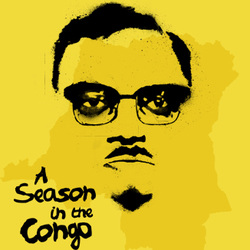
I wrote this review in December 1966 for the Financial Times and it is fascinating that only now is there a translation into English by Ralph Manheim which is opening at the Young Vic on 16 July:
"Une Saison au Congo (A Season in the Congo, 1966) is an outstanding work celebrating the life, and mourning the death, of Patrice Lumumba. It achieves a balance which is all too rare between left-wing idealism, and the depiction of colonial villainy. The reason for this that the form Césaire has chosen is near to the medieval morality plan. Lumumba is a mixture of Christ and Everyman, the Belgians are the stock buffoon agents of Satanic power (Satan himself is Uncle Sam). Battle is waged between innocence and evil, knowledge, truth and expediency, until the martyrdom of Lumumba is sealed. It manages to avoid the pitfalls of the documentary plan, too heavy an insistence on facts with a corresponding lifelessness of character and, even more impressively, it avoids the platform aspect which converts the playwright’s material to propagandist ends.
From the first moment we see Lumumba being savagely beaten by a pair of Belgian guards, we know whose side Césaire wants us to be on. But he never harangues us. He leaves his characters alone to get on with it, and human qualities emerge instead of doctrinal points. Compassion for the struggling ignorance of the Third World is all the more effective and thought-provoking to watch, because it is instinctive and not in any way clouded with remedies.
Césaire’s poetic gifts come to the fore in his underlining of his hero’s individual qualities, for Lumumba’s greatest gift is his deep imaginative grasp of the soul of his people. He wants to Congo to be Congolese, lackey of neither East nor West, freed from the suffocating machinations of international finance, freed from its own sense of inferiority. Lumumba tries to bring self-esteem to his people, wrench out of them a sense of dignity. The betrayal of Congolese independence by the great powers, the terrible decline from the exhalation of a new liberty to sordid massacres, and the furious spoil of civil war, have a decisive and controlled inevitability.
But the greatest pleasure and strength of Une Saison au Congo remains in the writing, which ranges from simple direct satire in the political scenes, through the most extraordinary flights of brilliant rhetoric, to witty and poetic evocations of the Congo. It conjures up jungle and shanty-town, the majestic river itself:
Père Congo,
tu charries des fleurs, des fles.
Qu’est-ce qui gonfle ton cœur gris
et de hoquets te brise? …
As well as tawdry nationalism, there is cynical political manoeuvring, and splendid passionate confrontations between black Congolese, Belgians, and Dag Hammarskjöld.
"Une Saison au Congo (A Season in the Congo, 1966) is an outstanding work celebrating the life, and mourning the death, of Patrice Lumumba. It achieves a balance which is all too rare between left-wing idealism, and the depiction of colonial villainy. The reason for this that the form Césaire has chosen is near to the medieval morality plan. Lumumba is a mixture of Christ and Everyman, the Belgians are the stock buffoon agents of Satanic power (Satan himself is Uncle Sam). Battle is waged between innocence and evil, knowledge, truth and expediency, until the martyrdom of Lumumba is sealed. It manages to avoid the pitfalls of the documentary plan, too heavy an insistence on facts with a corresponding lifelessness of character and, even more impressively, it avoids the platform aspect which converts the playwright’s material to propagandist ends.
From the first moment we see Lumumba being savagely beaten by a pair of Belgian guards, we know whose side Césaire wants us to be on. But he never harangues us. He leaves his characters alone to get on with it, and human qualities emerge instead of doctrinal points. Compassion for the struggling ignorance of the Third World is all the more effective and thought-provoking to watch, because it is instinctive and not in any way clouded with remedies.
Césaire’s poetic gifts come to the fore in his underlining of his hero’s individual qualities, for Lumumba’s greatest gift is his deep imaginative grasp of the soul of his people. He wants to Congo to be Congolese, lackey of neither East nor West, freed from the suffocating machinations of international finance, freed from its own sense of inferiority. Lumumba tries to bring self-esteem to his people, wrench out of them a sense of dignity. The betrayal of Congolese independence by the great powers, the terrible decline from the exhalation of a new liberty to sordid massacres, and the furious spoil of civil war, have a decisive and controlled inevitability.
But the greatest pleasure and strength of Une Saison au Congo remains in the writing, which ranges from simple direct satire in the political scenes, through the most extraordinary flights of brilliant rhetoric, to witty and poetic evocations of the Congo. It conjures up jungle and shanty-town, the majestic river itself:
Père Congo,
tu charries des fleurs, des fles.
Qu’est-ce qui gonfle ton cœur gris
et de hoquets te brise? …
As well as tawdry nationalism, there is cynical political manoeuvring, and splendid passionate confrontations between black Congolese, Belgians, and Dag Hammarskjöld.
 RSS Feed
RSS Feed
